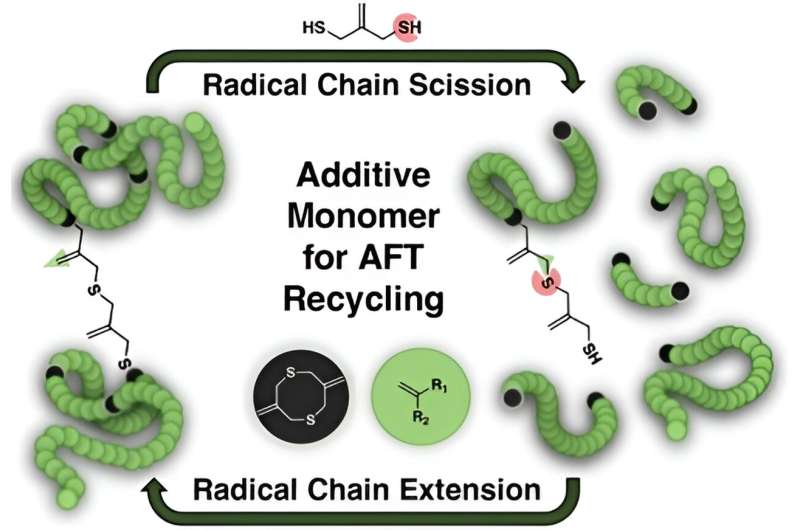
[ad_1]

Credit: Applied Chemistry International Edition (2023). DOI: 10.1002/anie.202316248
No one needs to be reminded that plastic production, and plastic pollution, has steadily increased over the years—the evidence is all around us. What if we were able to recycle plastic in a way that was truly sustainable?
This is the question raised by Rika Katsumata, Assistant Professor and Ph.D. Autumn Maino, a student in the Polymer Science and Engineering (PSE) Department in the College of Natural Sciences, is experimenting with polymer recycling to create new, environmentally conscious identities. Chemistry and technologies for polymer reprocessing.
It is their research. published In the journal Applied Chemistry International Edition.
Recycling Facts.
We’d all love to think that, despite our best efforts to avoid non-recyclables, the occasional styrofoam cup we toss in the trash can eventually be turned into a brand new cup containing There is little or no environmental impact, but the recycling process is more complicated than that.
Mechanical recycling relies on harsh temperature and processing conditions to reinvent selected streams of post-consumer waste as new products. Repeated exposure to these conditions results in material breakdown over time and thus deterioration of material properties—a result often referred to as “down-cycling.”
Alternatively, certain polymers can be chemically degraded and reformed, improving cycling longevity and material strength. However, chemical recycling is not possible for many commodity polymers used today.
Upcycling through chemistry
Katsumata and his team sought to create a more sustainable process for recycling and reprocessing polymers using what is known as additive fragmentation-transfer (AFT) chemistry, a field based on focused on bond exchange reactions. “There are plastics every day Large molecules are called polymers, which are composed of repeating units, or ‘monomers,'” explained Katsumata. “Many polymers are not able to be chemically broken down and reformed, because the carbon-carbon single bonds that make up the monomers are a are relatively stable.”
To solve this stability problem, PSE researchers developed an additive that copolymerizes with conventional monomers and generates main chain units that are capable of being exchanged through AFT chemistry.
“This dynamic linkage can promote both polymer suction (or sequestration) and polymer extension to complete closed-loop recycling,” Katsumata said. “Furthermore, the dynamic nature of our additive has the potential to ‘upcycle’, or add value to, products by taking commodity plastic waste and creating new types of specific polymers, such as copolymer adhesives. Facilitates other chemical changes.”
This work identified a new monomer compatible with existing methods of polymer synthesis, which creates a dynamic bond between monomer units that can be exploited to break down plastics after use. These small pieces of polymer, called oligomers, remain reactive and can serve as starting points from which new polymers can grow.
The team found that the cycle of breaking (chain fragmentation) and re-extending (chain extension) polymers could be repeated and modified to change the extent of scission and extension.
Creating awareness
A key driver behind this research was the eagerness to promote innovation. “Our research advances fundamental knowledge of AFT chemistry by revealing latent reactions after polymerization,” said Katsumata. “Furthermore, we hope our work has inspired Polymer Industries should invest in copolymerization strategies and other recycling technologies, particularly as it applies to polyolefin products.”
Katsumata and the PSE team feel that this research can serve as a basis for identifying new recycling methods and environmentally friendly chemistries and techniques – providing a glimpse into a future in which plastics and other challenging materials are managed in a more sustainable manner.
More information:
Autumn M. Mineo et al, A Versatile Comonomer Additive for Radically Recyclable Vinyl-Derived Polymers, Applied Chemistry International Edition (2023). DOI: 10.1002/anie.202316248
Provided by
University of Massachusetts Amherst
Reference: Polymer Science Team Develops Additive That Can ‘Upcycle’ Wide Range of Plastics (2024, February 22) https://phys.org/news/2024-02-polymer February 22, 2024 Retrieved from -science-team-additive-upcycle .html
This document is subject to copyright. No part may be reproduced without written permission, except for any fair dealing for the purpose of private study or research. The content is provided for informational purposes only.
[ad_2]


